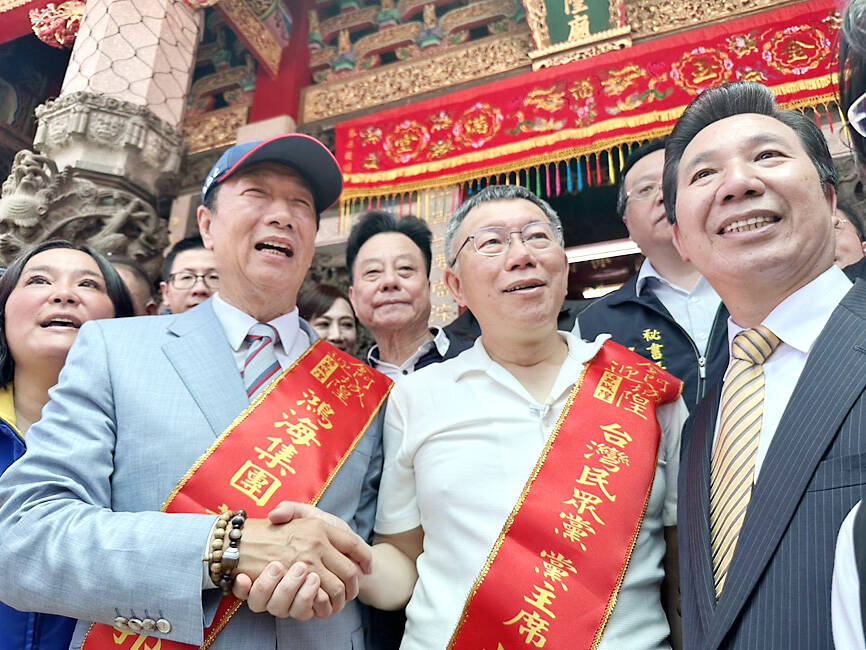Sunday’s meeting between independent presidential candidate Terry Gou (郭台銘) and Taiwan People’s Party (TPP) nominee Ko Wen-je (柯文哲) shows that anything — including a potential joint ticket between the two — is possible before Friday’s candidate filing deadline, Gou’s campaign said yesterday.
Huang Shih-hsiu (黃士修), a spokesman for Gou’s campaign, made the comments to reporters about the hour-long meeting at Gou’s home on Sunday night, one day after Ko’s negotiations on forming a joint ticket with the Chinese Nationalist Party (KMT) hit a wall due to disputes over polling results.
Huang said that KMT Chairman Eric Chu’s (朱立倫) dealings with Ko mirrored the “promise-breaking and breach of trust” Chu showed when Gou unsuccessfully sought the party’s presidential nomination in May.

Photo: Wu Cheng-Ting, Taipei Times
Given those actions, “the KMT might be on its own” in January’s election, Huang said.
Hon Hai Precision Industry Co (鴻海精密) founder Gou is preparing to register as an independent candidate, even as talks with Ko continue, and “any result is possible,” he said.
Regarding the possibility of a Gou-Ko ticket, Huang said that Gou did not have “any preset opinions” on the matter, and that Gou or Ko could lead a joint ticket.
At a rally on Sunday, Ko sent mixed signals on whether he would continue seeking an alliance with the KMT, saying he would “extend utmost goodwill” to unite opposition parties, but is committed to “fight to the end” as the TPP’s presidential candidate.
Regarding the meeting with Gou, a Ko campaign spokesperson was similarly vague, saying that the two had discussed ways to bring opposition candidates together.
The KMT, which has nominated New Taipei Mayor Hou You-yi (侯友宜) as its presidential candidate, has set tomorrow as its deadline for forming a joint ticket with Ko.
If that fails, both the KMT and TPP would have to quickly announce their running mates to register before the end of the week.
The candidates face Vice President William Lai (賴清德), the Democratic Progressive Party’s presidential candidate, who has consistently led the field in opinion polls.
Lai yesterday announced Hsiao Bi-khim (蕭美琴), who recently resigned as representative to the US, as his running mate.

Tropical Storm Gaemi strengthened into a typhoon at 2pm yesterday, and could make landfall in Yilan County tomorrow, the Central Weather Administration (CWA) said yesterday. The agency was scheduled to issue a sea warning at 11:30pm yesterday, and could issue a land warning later today. Gaemi was moving north-northwest at 4kph, carrying maximum sustained winds near its center of up to 118.8kph and gusts of 154.8kph. The circumference is forecast to reach eastern Taiwan tomorrow morning, with the center making landfall in Yilan County later that night before departing from the north coast, CWA weather forecaster Kuan Shin-ping (官欣平) said yesterday. Uncertainty remains and

SEA WARNING LIKELY: The storm, named Gaemi, could become a moderate typhoon on Wednesday or Thursday, with the Taipei City Government preparing for flooding A tropical depression east of the Philippines developed into a tropical storm named Gaemi at 2pm yesterday, and was moving toward eastern Taiwan, the Central Weather Administration (CWA) said. Gaemi could begin to affect Taiwan proper on Tuesday, lasting until Friday, and could develop into a moderate typhoon on Wednesday or Thursday, it said. A sea warning for Gaemi could be issued as early as Tuesday morning, it added. Gaemi, the third tropical storm in the Pacific Ocean this typhoon season, is projected to begin moving northwest today, and be closest to Taiwan on Wednesday or Thursday, the agency said. Today, there would likely

DISRUPTIONS: The high-speed rail is to operate as normal, while several airlines either canceled flights or announced early departures or late arrivals Schools and offices in 15 cities and counties are to be closed today due to Typhoon Gaemi, local governments announced last night. The 15 are: Taipei, New Taipei City, Taoyuan, Tainan, Keelung, Hsinchu and Kaohsiung, as well as Yilan, Hualien, Hsinchu, Miaoli, Chiayi, Pingtung, Penghu and Lienchiang counties. People should brace for torrential rainfall brought by the storm, with its center forecast to make landfall on the east coast between tonight and tomorrow morning, the Central Weather Administration (CWA) said. The agency issued a sea warning for the typhoon at 11:30pm on Monday, followed by a land warning at 11:30am yesterday. As of

CASUALTY: A 70-year-old woman was killed by a falling tree in Kaohsiung as the premier warned all government agencies to remain on high alert for the next 24 hours Schools and offices nationwide are to be closed for a second day today as Typhoon Gaemi crosses over the nation, bringing torrential rain and whipping winds. Gaemi was forecast to make landfall late last night. From Tuesday night, its outer band brought substantial rainfall and strong winds to the nation. As of 6:15pm last night, the typhoon’s center was 20km southeast of Hualien County, Central Weather Administration (CWA) data showed. It was moving at 19kph and had a radius of 250km. As of 3pm yesterday, one woman had died, while 58 people were injured, the Central Emergency Operation Center said. The 70-year-old